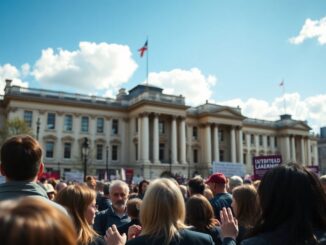A deep dive into the fallout from insensitive political statements amid tragedy, highlighting the need for accountability and the weight of public discourse.

Topics covered
In the aftermath of any tragedy, especially those resulting in loss of life, it’s common for the public to feel a whirlwind of emotions—grief, anger, and a strong desire for accountability. But what happens when that emotional response is clouded by tone-deaf political commentary? The recent shootings in Minnesota, which claimed the lives of state representatives, have not only ignited outrage over the violence itself but also sparked criticism aimed at certain political figures’ responses.
This situation raises some uncomfortable questions: How should politicians engage with the public during crises, and what role do they play in shaping the national conversation?
Examining the Numbers: The Impact of Political Rhetoric
When tragedy strikes, the data surrounding public sentiment can tell a compelling story.
Have you ever wondered how political statements influence collective responses? Analyzing social media interactions, public opinion polls, and media coverage can shed light on this vital question. Take the Minnesota shootings, for example—Senator Mike Lee’s insensitive remarks weren’t just isolated incidents; they reflect a troubling trend in how some politicians engage with pressing issues.
The immediate aftermath of the tragedy saw a notable spike in online engagement, with many expressing outrage over Lee’s posts. This highlights a significant aspect of modern political communication: the potential for backlash. Politicians need to understand that their words carry weight; they can either foster unity or deepen divisions. The data reveals that insensitive comments can lead to increased scrutiny and a decline in public trust—outcomes that can be detrimental not only to a politician’s career but also to the broader political landscape.
Case Studies: Successes and Failures in Political Communication
Reflecting on similar situations, we can spot key successes and failures in political communication following tragedies. For instance, when former President Obama addressed the nation after mass shootings, his empathetic and measured responses often resonated deeply with the public, cultivating a sense of unity. On the flip side, instances where politicians have taken a lighthearted approach to violence have resulted in significant backlash, as seen in the Minnesota case.
These examples underscore the necessity of understanding the audience and the emotional weight of the moment. Politicians must tread carefully, balancing the need to express their views with the imperative to acknowledge the pain experienced by their constituents. The failures stemming from insensitive rhetoric serve as critical lessons for current and future leaders on how to navigate sensitive topics effectively.
Lessons for Politicians and Public Figures
For those in positions of influence, the takeaways from these incidents are profound. First and foremost, accountability is key. Politicians must grasp the impact of their words, especially in the context of national tragedies. Constructive dialogue should be the goal, rather than divisive rhetoric that can escalate tensions.
Additionally, fostering an environment where accountability is the norm is crucial. Public figures should be ready for scrutiny and embrace constructive criticism as a pathway to growth. The responsibility extends beyond what is said; it also encompasses how those words are received by the public.
Actionable Takeaways
As we reflect on the implications of political discourse in the wake of tragedy, here are several actionable takeaways for public figures:
- Prioritize empathy in communication—acknowledge the human impact of violence.
- Engage with constituents directly to grasp their concerns and sentiments.
- Be aware of the potential for backlash; choose words carefully to avoid misinterpretation.
- Encourage a culture of accountability within political circles to foster responsible communication.
In conclusion, the relationship between tragic events and political discourse is complex yet crucial for the health of our democratic society. By learning from past mistakes and prioritizing meaningful dialogue, public figures can help cultivate a more empathetic and informed discourse. So, how will you engage in these conversations moving forward?




